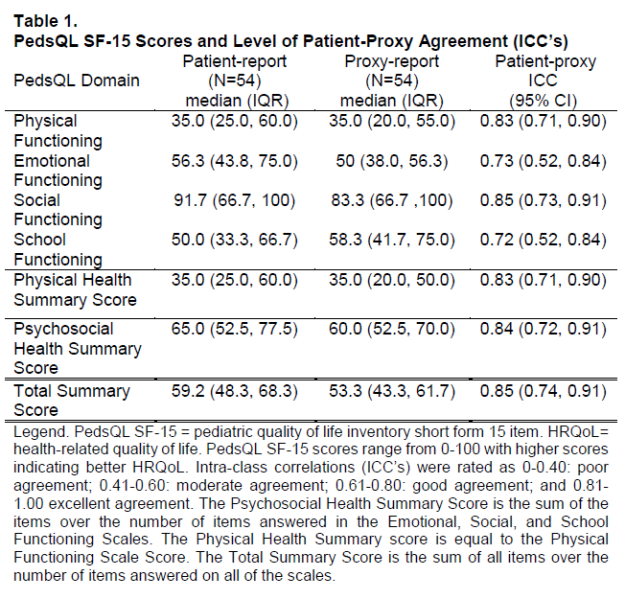Session Information
Date: Monday, October 22, 2018
Session Type: ACR Poster Session B
Session Time: 9:00AM-11:00AM
Background/Purpose: The administration of proxy-reported health-related quality of life (HRQoL) measures in the assessment of juvenile fibromyalgia syndrome (JFMS) is common but its added clinical value to patient-reported measures is unclear. The aim of this study was to examine the level of agreement between patient- and proxy-reports of the Pediatric Quality of Life Inventory Short Form 15 (PedsQL SF-15) among children with JFMS and to examine potential factors influencing patient-proxy agreement. Given the strong parent-child pain relationship, we hypothesized good agreement.
Methods: This was a cross-sectional cohort study of children 8-17 years old presenting for initial evaluation to a pediatric rheumatology pain clinic from April 2017 – April 2018. Included subjects met the 2010 American College of Rheumatology criteria for fibromyalgia syndrome. All patients and proxies completed electronic questionnaires, including the PedsQL SF-15, as part of routine clinical care. Additional information collected included age, sex, race, ethnicity, verbal pain score (0-10), and pain duration (months). Descriptive statistics were performed to assess patient characteristics. Intra-class correlation (ICC) estimates and their 95% confidence intervals were calculated based on a mean-rating, absolute-agreement, 2-way mixed-effects model to examine patient-proxy agreement on the PedsQL SF-15. We performed multiple regression analyses to explore the relationship between different independent variables and patient-proxy agreement.
Results: Over the study interval, 54 patient-proxy pairs met criteria and completed the HRQoL measures. The majority of patients were non-Hispanic (94%), Caucasian (79%), and female (83%). The median age at time of presentation was 15 years (IQR: 14, 16). The median verbal pain score was 5 (IQR: 4, 7). Median duration of pain was 24 months (IQR: 12-36). Cronbach’s alpha coefficient for the PedsQL SF-15 exceeded 0.70. All domains demonstrated good to excellent agreement between patients and proxies (Table 1). Multiple regression analyses, adjusting for patient sex, Caucasian race, age, current pain level and pain duration showed that the greater the child’s pain, the greater the patient-proxy agreement on the Total Scale (β = -1.20, p<0.05) and the Emotional Functioning Scale (β = -2.03; p<0.05).
Conclusion: The high levels of patient-proxy agreement in this study suggest that children with JFMS and their parents communicate their feelings and opinions well to one another and this agreement is associated with greater pain severity in the child. These findings reflect the enmeshed relational and communication styles between children with JFMS and their parents. In order to facilitate adolescents becoming partners in their own healthcare and to decrease the burden of multiple questionnaires, we propose focusing on children’s own perceptions of HRQoL.
To cite this abstract in AMA style:
Gmuca S, Urquhart A, Sherry DD. Patient-Proxy Agreement on Health-Related Quality of Life in Juvenile Fibromyalgia Syndrome [abstract]. Arthritis Rheumatol. 2018; 70 (suppl 9). https://acrabstracts.org/abstract/patient-proxy-agreement-on-health-related-quality-of-life-in-juvenile-fibromyalgia-syndrome/. Accessed .« Back to 2018 ACR/ARHP Annual Meeting
ACR Meeting Abstracts - https://acrabstracts.org/abstract/patient-proxy-agreement-on-health-related-quality-of-life-in-juvenile-fibromyalgia-syndrome/

